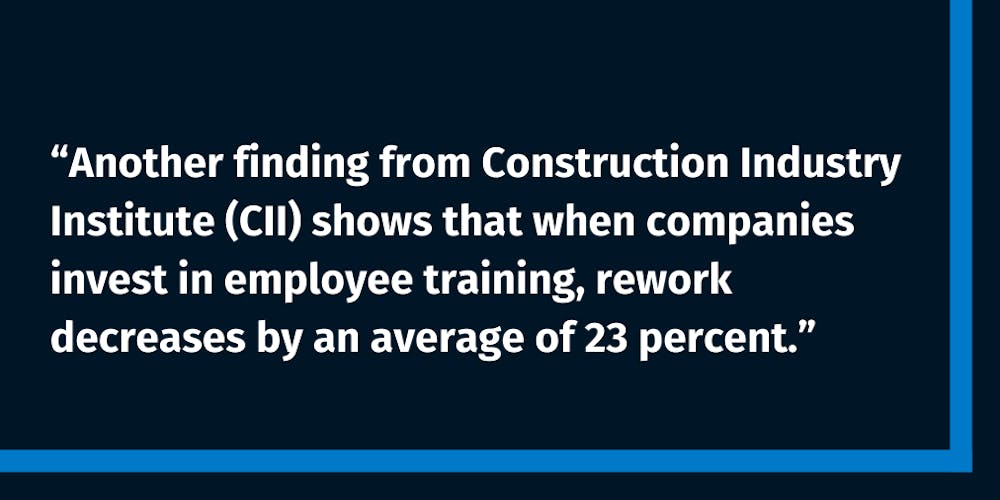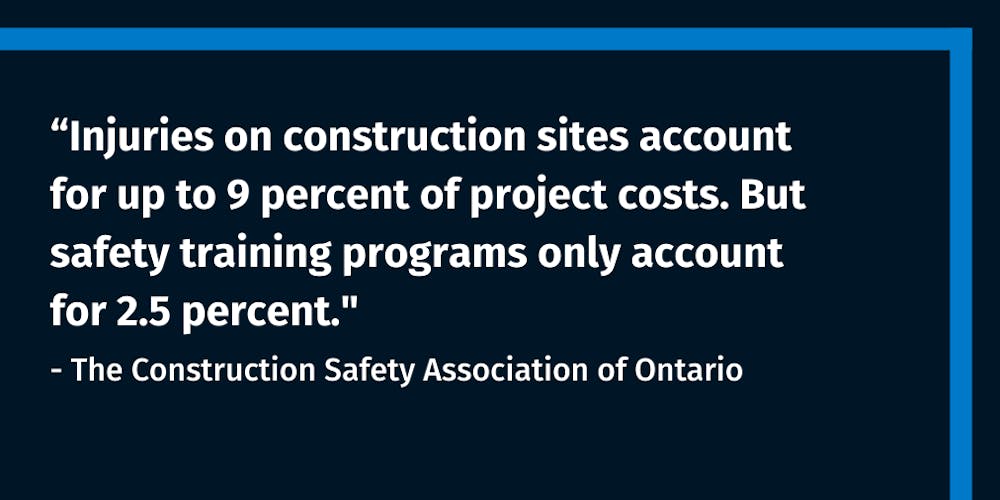One of the most important jobs a construction supervisor has is to train new employees. But it doesn’t always feel that way.
In fact, overseeing construction job training can feel like a time-suck that slows projects and gets in the way of progress. And why train someone on how to do something, when it seems easier and faster to do the job yourself?
But, that kind of thinking is actually counterproductive.
Avoiding training puts unskilled workers in the field. And their shoddy work often contributes to the need for rework, or worse, causes accidents on site. In turn, these problems increase job costs and lower productivity.
On the flip side, a study from the Construction Industry Institute (CII) shows that investing just 1 percent of a project’s budget in employee training increases productivity by 11 percent.
That’s a great ROI.
And the benefits don't stop there. Training new employees creates long term effects that make a foreman’s job much easier.
From improving safety and morale to reducing turnover, here’s why smart construction supervisors don’t skimp on training new employees.
On-the-Job Training Is a Powerful Recruiting Tool
Recruiting employees becomes much easier when on-the-job training is part of the benefits package.
Job seekers, no matter what age bracket, are looking for companies who are willing to invest in teaching them skills that will help them advance their careers. In fact, 86 percent of employees say they value on-the-job training.
Millennials rank being well-trained as their top concern when starting a new job. And 60 percent would take a pay cut to work at a company that offered mentorship opportunities.

So offering on-the-job training, as well as continued training to advance new employees up the ranks, will quickly set your firm apart from its competitors.
Plus, offering these kinds of incentives attracts workers with a strong sense of ambition, so you’ll be able to build a workforce of people who take initiative and work hard for your company.
New Employee Training Leads to Better Retention Rates
Conventional wisdom says that the easiest way to get and keep skilled workers on your team is to find day-one-ready hires.
But there are several problems with that idea:
- Experienced workers take longer to find
- Skilled craftsman cost more to hire
- Experience at another construction firm could mean they aren’t willing to learn your company’s way of doing things
- Experience can come with an ego that impedes loyalty to your company
- There is a shortage of skilled construction workers
On the other hand, the main problem with hiring lesser-skilled employees is that you’ll spend more time training them. But that investment in time and training pays off in the long run.
Giving new workers a valuable skill set gives them higher job satisfaction. They feel like a part of something bigger than themselves, become loyal employees, and stay longer.
How much longer?
The aforementioned survey from the CII found that training in construction increased retention rates by 14 percent and decreased absenteeism by 15 percent.
Training Employees Strengthens Company Culture
By investing time and resources to train your employees, you’re creating a better company culture.
Training employees shows them they are valued. And when people feel valued by their higher-ups, they, in turn, value being a part of the company.
This feeling of belonging does more than just create loyalty to the company. It also helps employees to value their co-workers. Training paves the way to a company culture of inclusion and acceptance and helps foster an environment where team players can thrive.
Putting an emphasis on training programs also helps create a culture that values learning, safety and quality workmanship. And that is the kind of culture every company strives to have.
Construction Job Training Creates a Quality Workforce
High-quality work can only come from high-quality workers. And, let’s face it, the only way unproven craftsmen can become skilled workers is through time and training.
But again, the investment pays off. Another finding from CII shows that when companies invest in employee training, rework decreases by an average of 23 percent.
So when you invest in new employee training, you’re investing in quality because you’re setting the expectation of quality work from the beginning of your relationship with your hires.

Better Training Means Increased Safety
According to The Construction Safety Association of Ontario, “Increased training, more frequent inspections, and more health and safety meetings with field supervisors result in fewer lost-time injuries, lower costs, and a larger profit margin.”
If you find that hard to believe, consider this: injuries on construction sites account for up to 9 percent of project costs. But safety training programs only account for 2.5 percent.
One company found that when they had regular safety training on-site, they saw up to a 25 percent decrease in preventable injuries.
That’s a lot of statistics that add up to this: training employees on proper safety protocols is a smart move.
Workers who are trained to understand how to operate equipment and move around a construction site safely don’t cause accidents that lead to lost time, lost money, or worse, loss of life.
Well-Trained Employees Are More Productive
Take a look at four of the benefits that have been covered so far:
- Increased retention rates
- Lowered absenteeism
- Decreased rework
- Decreased accident rate
When skilled workers stay at your company for longer periods of time, more work gets done. When employees show up for work more than they stay out, more work gets done. When your crew doesn’t have to tear down and rebuild, more work gets done. When there are fewer accidents, more work gets done.
You get the point. Well-trained workers make your company more productive.
Training Programs Will Reduce Industry-Wide Skills Gaps
Finding skilled workers is a challenge that hasn’t been getting any easier. In fact, 95 percent of construction industry leaders are concerned that their workers don’t have adequate skills to do their jobs. And 39 percent believe it will become more difficult to find skilled craftsmen in the future.
And it isn’t just new hires that are lacking skills. The industry is rampant with stories of defaults and defects from subcontractors. In fact, a Commercial Construction Index survey participant had this to say, “My single most important concern about my business in the next 12 months is finding subcontractors that can perform. Lots of defaulting on contracts and poor performance from subs currently.”

So, some construction firms have taken a new approach. They now hire and train employees to do the jobs that they would normally hire subcontractors to do. And as they fill a need within their company, they are also helping to fill the skills gap that is plaguing the construction industry.
Conclusion
Henry Ford said it best, “The only thing worse than training your employees and having them leave is not training them and having them stay.”
There are many methods you can use to train your new hires.
You can match them with experienced team members. You can create an apprenticeship program. You can use online learning initiatives. Or you can do a mixture of all these things.
But the point is this: if you put in the effort to train your employees, it will be well rewarded.









